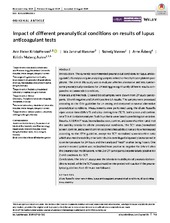Impact of different preanalytical conditions on results of lupus anticoagulant tests
Peer reviewed, Journal article
Published version

Åpne
Permanent lenke
https://hdl.handle.net/1956/23305Utgivelsesdato
2019Metadata
Vis full innførselSamlinger
Originalversjon
https://doi.org/10.1111/ijlh.13102Sammendrag
Introduction: The currently recommended preanalytical conditions for lupus anticoagulant (LA) analysis require analyzing samples in fresh or freshly frozen platelet‐poor plasma. The aim of this study was to evaluate whether alternative and less cumbersome preanalytical procedures for LA testing give significantly different results compared to recommended conditions. Materials and Methods: Citrated blood samples were drawn from 29 study participants, 15 with negative and 14 with positive LA results. The samples were processed according to the ISTH guideline for LA testing and compared to several alternative preanalytical conditions. Measurements were performed using the dilute Russell's viper venom time (DRVVT) and silica clotting time (SCT), both screen and confirm, on a STA‐R Evolution analyzer. Stability criteria were based upon biological variation. Results: All DRVVT tests (normalized screen, confirm, and screen/confirm ratio) met the stability criteria for all the preanalytical conditions. The SCT tests (normalized screen, confirm, and screen/confirm ratio) met the stability criteria only when treated according to the ISTH guideline, except for SCT normalized screen/confirm ratio which also met the stability criteria for double‐centrifuged aliquoted plasma stored in room temperature for 24 hours and then analyzed “fresh” or after being frozen. One warfarin‐treated patient was reclassified from positive to negative for DRVVT after the preanalytical modifications, while 2 of 29 participants became falsely positive for 2 of 8 conditions for SCT. Conclusions: The DRVVT assays met the criteria for stability for all preanalytical conditions tested, while the SCT assays should be interpreted with caution if the preanalytical guidelines from ISTH are not followed.
